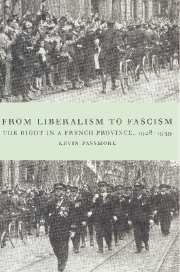Book contents
- Frontmatter
- Contents
- List of illustrations
- Preface
- List of abbreviations
- 1 Introduction
- 2 From France to the Rhône
- 3 Urban society in the Rhône
- 4 Rural society in the Rhône
- 5 The crisis of the right I: 1928–1932
- 6 The impact of the economic crisis
- 7 The crisis of the right II: 1932–June 1936
- 8 The Croix de Feu
- 9 The right and the Popular Front
- 10 Conclusion
- Appendix 1 Equations for multiple regressions
- Appendix 2 The conservative deputies of the Rhône, 1928–1940
- Select bibliography
- Index
1 - Introduction
Published online by Cambridge University Press: 23 December 2009
- Frontmatter
- Contents
- List of illustrations
- Preface
- List of abbreviations
- 1 Introduction
- 2 From France to the Rhône
- 3 Urban society in the Rhône
- 4 Rural society in the Rhône
- 5 The crisis of the right I: 1928–1932
- 6 The impact of the economic crisis
- 7 The crisis of the right II: 1932–June 1936
- 8 The Croix de Feu
- 9 The right and the Popular Front
- 10 Conclusion
- Appendix 1 Equations for multiple regressions
- Appendix 2 The conservative deputies of the Rhône, 1928–1940
- Select bibliography
- Index
Summary
In April 1928 Raymond Poincaré led the right to its second and last clear majority under the Third Republic. Once the Radical-Socialist Party conference of November 1928 had ordered its representatives to leave an administration too reactionary for its tastes (the ‘coup d'Angers’)? conservatives took sole responsibility for government. The left meanwhile had been reduced to disarray by the fiasco of the Cartel des gauches government of 1924 to 1926; the extreme right, which had briefly flourished during that period, was also in decline. Many conservatives believed themselves to be on the threshold of a new era.
Yet 1928 proved to be yet another false dawn in the history of the right. In both parliament and country it remained as fragmented as it had ever been. The system of proportional voting by list which had been used for the elections of 1919 and 1924 had imposed an unusual degree of electoral discipline on the right. But since negotiations between tendencies were carried on informally by political barons, extra-parliamentary political organisation withered away. In parliament the deputies of the right were dispersed in five groups in the legislatures of both 1919 and 1924. The restoration of two-round single-member constituency voting in 1928 meant that local complexities could once again come to the fore. Party structures also revived. There were, however, three distinct movements within the parliamentary right: the Catholic Fédération républicaine, the secular Alliance républicaine démocratique and the recently formed Christian democratic Parti democrate populaire (PDP). None of these was able to unite the right in the Chamber of Deputies, where there were now six groups of the right and centre-right.
- Type
- Chapter
- Information
- From Liberalism to FascismThe Right in a French Province, 1928–1939, pp. 1 - 19Publisher: Cambridge University PressPrint publication year: 1997

